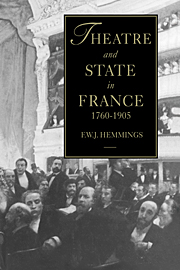Book contents
- Frontmatter
- Contents
- Chronology
- Introduction
- 1 The royal theatres of the ancien régime
- 2 The rise of the commercial theatre
- 3 Dramatic censorship down to its abolition
- 4 The liberation of the theatres
- 5 The royal theatres under the Revolution
- 6 The theatre in the service of the Republic
- 7 Re-establishment of the state theatres
- 8 Curbs on the commercial sector
- 9 Politics and the pit
- 10 The theatre in the provinces
- 11 The licensing system, 1814–1864
- 12 The state-supported theatres in the nineteenth century
- 13 The theatre in crisis: competition from the café-concert
- 14 Dramatic censorship in the nineteenth century
- 15 The private sector
- Notes
- Bibliography
- Guide to further reading
- Index
13 - The theatre in crisis: competition from the café-concert
Published online by Cambridge University Press: 31 October 2009
- Frontmatter
- Contents
- Chronology
- Introduction
- 1 The royal theatres of the ancien régime
- 2 The rise of the commercial theatre
- 3 Dramatic censorship down to its abolition
- 4 The liberation of the theatres
- 5 The royal theatres under the Revolution
- 6 The theatre in the service of the Republic
- 7 Re-establishment of the state theatres
- 8 Curbs on the commercial sector
- 9 Politics and the pit
- 10 The theatre in the provinces
- 11 The licensing system, 1814–1864
- 12 The state-supported theatres in the nineteenth century
- 13 The theatre in crisis: competition from the café-concert
- 14 Dramatic censorship in the nineteenth century
- 15 The private sector
- Notes
- Bibliography
- Guide to further reading
- Index
Summary
In 1889, looking back nostalgically at what appeared to him the golden age of the July Monarchy, the theatre critic Jean-Jacques Weiss painted a glowing picture of that distant age when, whatever the quality of the theatrical entertainment on offer in Paris, there could be no argument about its quantity. Apart from the five state-supported theatres, ‘eight dramatic blast-furnaces were constantly alight and kept stoked up under King Louis-Philippe‘: the Porte-Saint-Martin, the Ambigu and the Gaîté, specializing in melodrama; the Gymnase, the Vaudeville and the Palais-Royal whose repertoire stretched from vaudeville to farce and appealed primarily to the lower middle classes; the Funambules, where Deburau reigned supreme in the pantomime; and last and least, the tiny Petit-Lazari, favoured resort of the prentice boys, a fleapit of the basest sort but always well attended. ‘None of these stood idle for a single day … It was a furious seething, the pot boiling over with plays of every description, comic, dramatic, farcical, lugubrious, nonsensical, realistic, warlike, pacific, familiar, epic, the effect of which was still felt during the succeeding period even though it was more sterile, the fizz having gone out of it.’ An evening at the theatre commonly lasted from five in the afternoon to ten or eleven at night, each programme including three or four different plays all of which had the shortest of runs; the fifteen theatres open in Paris, not including the suburban houses, offered in 1832 no fewer than 257 new plays.
- Type
- Chapter
- Information
- Theatre and State in France, 1760-1905 , pp. 193 - 203Publisher: Cambridge University PressPrint publication year: 1994



